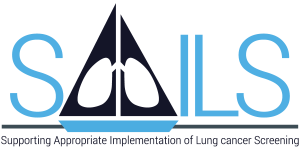Related Stories
Sheps researchers awarded seed grant for quality improvement in lung cancer screening implementation

Daniel Reuland, MD MPH, was recently awarded a seed grant from the UNC Institute for Healthcare Quality Improvement (https://www.med.unc.edu/ihqi) to address quality gaps related to implementation of lung cancer screening. Alison Brenner, PhD, who is joining the Sheps Center as a Research Scientist, helped to develop this proposal during her postdoctoral fellowship, and will serve as a key co-Investigator.
In 2014, the US Preventive Services Task Force (USPSTF) issued a B recommendation lung cancer screening with annual low dose CT (LDCT) be offered to current and former (within 15 years) smokers, ages 55-80 with at least 30 pack-years of smoking history. While screening has been shown to reduce the risk of lung cancer mortality, it also introduces the potential for considerable harms. Suboptimal implementation of lung cancer is unlikely to yield population benefit, but high-quality implementation of screening remains a critical challenge at UNC.

This project, a component of the Supporting Appropriate Implementation of Lung cancer Screening (SAILS) Project, will extend implementation guidance generated by a Dissemination and Implementation pilot co-funded by NC TraCS and the Sheps Center. In that project, Drs Reuland and Brenner tested the feasibility and effect of using a deliberative approach to guide implementation policy development. The primary goal of the project was to develop a uniform policy for the implementation of the lung cancer screening guidelines, endorsed by the health care system (including administrators, generalist and specialist leadership, and quality improvement leadership), agreeable to the target patient population, and operationalized, in part, by primary care providers.

Several key quality gaps hinder implementation: accurate identification of patients potentially eligible for screening, the use and documentation of shared decision making prior to referral for and ordering of screening (a requirement for payment by Medicare), and tracking and follow-up of screen detected lung nodules. Through this and other projects, Drs. Reuland, Brenner, and collaborators from UNC’s Primary Care Improvement Collaborative, Pulmonary Medicine, and Radiology will use Lean Six Sigma quality improvement methodology to develop and test a multidisciplinary change package aimed at testing and improving screening processes across primary care, pulmonary medicine, and thoracic radiology. The change package will include systematic protocols for collecting smoking history and delivering decision support, as well as infrastructure development for documentation of shared decision-making and nodule follow-up.
You must be logged in to post a comment.